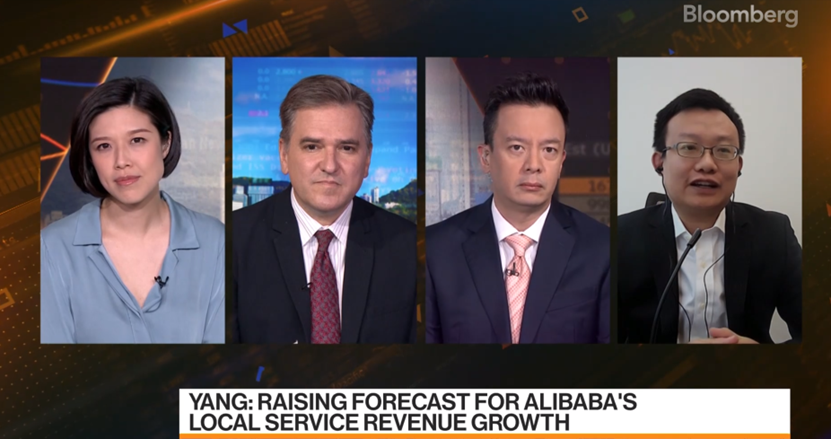2023-09-01
Blue Lotus
June 21st , 2023
Blue Lotus Research Institute's Managing Director, Mr. Shawn Yang, recently had an interview with Bloomberg regarding Alibaba on June 21st. He discussed Alibaba's new organizational changes, future IPO plans for its subsidiary business groups, and the market competition landscape and unique features of LLM products.
 |
BBG interview on June 21st
Q: Is Alibaba an old dog trying to compete in this brave new world of Web 3? Is it structured to be able to compete properly moving forward right now?
A: They are definitely one of the oldest Chinese internet companies, around 20 years old. But I think they are trying to make some changes. I believe you have already seen some of their statements. Basically, they are also facing a crucial moment because their Taobao and Tmall are encountering competition from PDD and Douyin. Additionally, their cloud business is facing intensified competition with other cloud service providers too, and they are also trying to catch up with AI trends. There will definitely be many challenges. So, I think the industry is experiencing new leadership. I just hope that they can make some changes.
Q: It's new leadership but with old players. Coming back to a company that is almost like a shadow of itself. Now, after this sort of restructuring, do you think this management shakeup actually makes sense to you? And how do you see Wu and Tsai following through on this?
A: I definitely hope that they are recruiting some new people. For example, people used to have high expectations for Jiang Fan, but now he's responsible for overseas business. Another thing to consider is that if you look at Eddie's background, he has a lot of experience in terms of technology development, revenue generation, and corporate governance. But I think something may be missing, which is a connection with the merchants. His governance experience is more of a “grassroots” background. In terms of the new leadership, I don't think they are very new. So, people want to see a younger generation. I think this is something that Alibaba has to address.
Q: I asked this question about the six divisions that they are separating into. They're going to have separate fundraising and also potential IPOs. Obviously, Tmall and Taobao, they are going to be the big revenue generators. But where do you expect the first IPO? Where's the first shoe to drop as far as spinning off these companies and being attractive to the markets?
A: I think that Cainiao and probably Freshippo (Hema) are considering being the first to be listed. Also, I believe Ali Cloud has a high chance because Ali Cloud is one of the few groups that have proven they can achieve a positive EBITDA margin. Freshippo is a small business, but it is growing very fast and has some unique advantages in first-tier cities. As for Cainiao, it's because the China logistics industry is becoming more fragmented nowadays. You could even see a possible IPO of J&T Express, which suggests that Cainiao also likely has bargaining power. Additionally, there's another business group that has undergone many changes recently, the international business, including Lazada and AliExpress. They are growing very rapidly. So, I think these four business groups are probably the ones that will receive more support from investors.
Q: Do you like the idea of bringing back Joe Tsai? He's a bit distracted with the Brooklyn Nets and other e-sports and sports companies or teams that he owns. I know he knows the company intimately. He helped co-found in 1999, but so much has changed in the last three years. Is he the right man to help navigate Alibaba through the new regulatory environment in China?
A: I think Eddie and Joe Tsai will bring something new to Alibaba because Daniel Zhang's working style is very different from them. He works very long hours and pays a lot of attention to business details. However, I think that Joe Tsai and Eddie Wu have a different approach. Each business group is being granted as much autonomy as possible, with the central leadership providing background support such as financial, strategic guidance, and technology assistance. I believe this will likely become the new approach, allowing middle-level management to have more decision-making authority. One lesson learned from companies like Meituan and PDD is that decisions are often better made by those directly involved in the frontlines, rather than by a highly centralized headquarters. This aligns with their plan to separate into six business groups.
Q: If you had to pick one stock to bet on in the e-commerce sector in China, wouldn't it be Alibaba?
A: Unfortunately, no. I believe Alibaba is still losing market share, so I would probably choose PDD.
Q: In terms of AI, I know that moving Daniel Zhang to head the AI business indicates that this business is becoming more of a priority. However, you could say that they're also somewhat lagging behind the likes of Baidu. Do you think Alibaba has the room to catch up with the progress of other big names in the AI space?
A: Yes, yesterday Tencent also announced their LLM. When comparing Alibaba to Baidu and Tencent, each has its own advantages. For instance, Alibaba excels in providing better service, which means they have more engineers and can customize products based on the requirements of large enterprises. This is similar to their approach in the cloud business, as mentioned in their press conferences. Baidu, on the other hand, places a stronger emphasis on technology, aiming to solve various issues with a single model or product. Tencent focuses more on its connection with social platforms. Therefore, I believe AI will further strengthen their respective core businesses: Alibaba on service, Baidu on technology, and Tencent on social platforms.